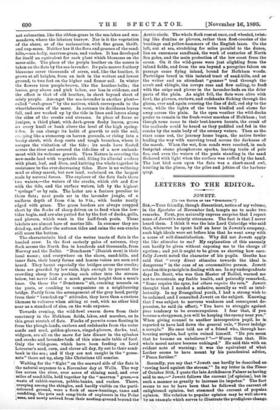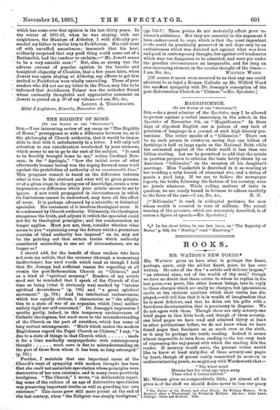LETTERS TO THE EDITOR
JOWETT.
[To THE EDITOIG Of THE " SPZCTATOR."3 SIR,—Your friendly, though dissentient, notice of my volame;_ in the Spectator of November 2nd, tempts me to make two. remarks. First, you naturally express surprise that I report none of Jowett's saintly utterances. The fact is that I never heard them. I think it was the late Lord Coleridge who said that, whenever he spent half an hour in Jowett's company,. such high ideals were set before him that he went away with a sense of self-dissatisfaction. Why did not Jowett apply. the like stimulus to me? My explanation of this anomaly can hardly be given without exposing me to the charge of
; and yet it ought to be given as showing how care- fully Jowett noted the character of his pupils. Goethe has. said that " every direct stimulus towards the ideal is- dangerous " in the case of an oversensitive person. Jowett acted on this principle in dealing with me. In my undergraduate days Dr. Scott, who was then Master of Balliol, warned me not to overstrain my feeble health, and pointedly remarked,. "Some require the spur, but others require the rein." Jowett thought that I needed a sedative, morally as well as intel- lectually. In my Evangelical youth, I had a strong wish to. be ordained, and I consulted Jowett on the subject. Knowing- that I was subject to nervous weakness and consequent de- pression, he said (in effect), "You have to struggle against your tendency to be overscrupulous. I fear that, if you. become a clergyman, you will be keeping the enemy near you." When giving counsel to another introspective pupil, he is. reported to have laid down the general rule, "Never indulge a scruple." He once told me of a friend who, through har- bouring scruples, had quite ruined himself. "Do you mean that he became an unbeliever ? "—" Worse than that. His, whole moral nature became unhinged." He said this with an evident note of warning; it was the equivalent of what Luther seems to have meant by his paradoxical advice, " Pecca fortiter."
Secondly, you say that "Jowett can hardly be described as 'rowing hard against the stream." In my letter in the Times- of October 30th, I quote the late Archdeacon Palmer as having said to me,—" Jowett follows the current [of opinion], but in such a manner as greatly to increase its impetus." The fact seems to me to have been that he followed the current of enlightened opinion, but stemmed the current of populaa. opinion. His relation to popular opinion may be well shown by an example which serves to illustrate the prodigious change.
which has come over that opinion in the last thirty years. In the winter of, 1861-62, when he was staying with our neighbours, the Stanlays of Alderley, I with difficulty per- suaded my father to invite him to Peckforton. His visit went .off with unruffled smoothness; insomuch that his host, evidently surprised that any good thing could come out of a Rationalist, had the candour to exclaim,—" Mr. Jowett seems ' to be a very amiable man ! " But, alas, so strong was the adverse current of popular opinion in the bucolic and benighted oligarchy of Cheshire, that a few years later, when ' -Jowett was again staying at Alderley, my efforts to get him invited to Peckforton were wholly unavailing. Those of your
- readers who did not see my letter in the Times, may like tobe informed that Archdeacon Palmer was the orthodox friend whose eminently thoughtful and appreciative comment on .Jowett is quoted on p. 39 of my volume.—I am, Sir, &c.,



















































 Previous page
Previous page